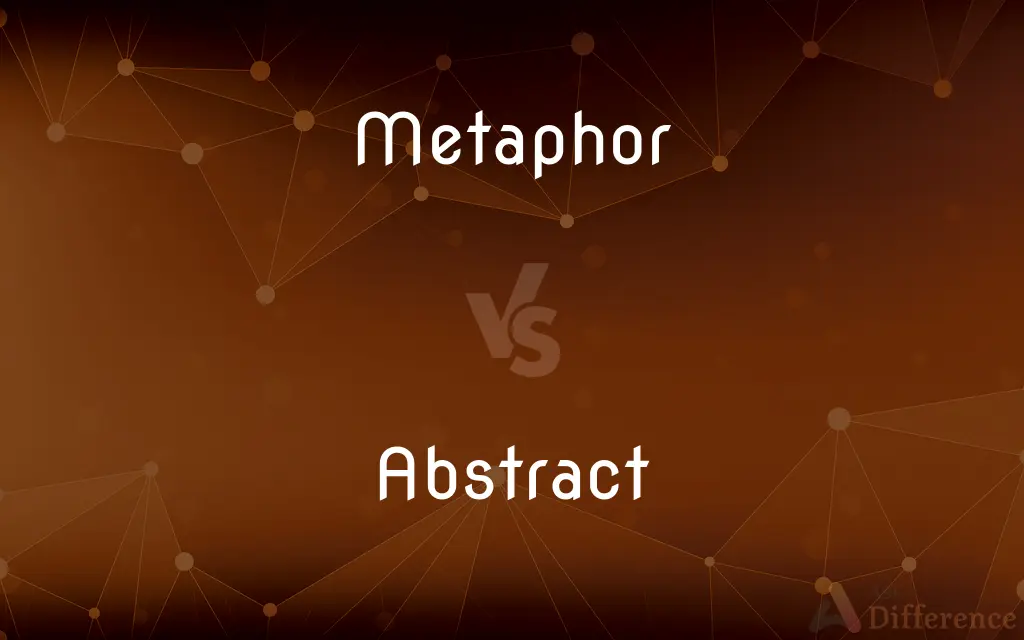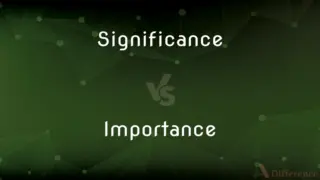Metaphor vs. Abstract — What's the Difference?
By Tayyaba Rehman — Updated on November 1, 2023
A metaphor is a figure of speech comparing two unlike things, while abstract refers to concepts or ideas not physically tangible.

Difference Between Metaphor and Abstract
Table of Contents
ADVERTISEMENT
Key Differences
A metaphor is a rhetorical device used in language to imply a resemblance by speaking of one thing in terms of another. Abstract, however, describes an idea, concept, or term that is not concrete or related to physical, tangible entities.
Metaphorically speaking, life can be described as a journey, which illustrates the use of metaphor to convey complex concepts. In contrast, the abstract concept of love defies precise, physical representation and remains an idea open to interpretation.
Metaphors create vivid images in the mind through indirect comparison, like saying "time is a thief" which doesn't literally steal, but abstractly implies loss. Abstract terms, such as justice or freedom, are often subjective and can vary greatly in meaning depending on personal or cultural perspectives.
Metaphors are essential in poetic and literary contexts for their evocative power, encapsulating abstract notions in a tangible form. On the other hand, abstract terms are crucial in philosophical and theoretical discussions where physical representations are absent.
Each metaphor carries its unique weight of meaning, depending on the context it is used, like "a blanket of snow". The abstract nature of thought means one cannot simply point to a single physical embodiment of it.
ADVERTISEMENT
Comparison Chart
Definition
Figure of speech for indirect comparison
Concept without physical existence
Usage in Language
Literary device to evoke imagery
Term to discuss non-tangible ideas
Example
"The world's a stage"
The idea of "beauty" or "justice"
Nature
Often used for creative expression
Used in theoretical or philosophical context
Dependence on Context
Meaning depends on context
Meaning can be universally understood
Compare with Definitions
Metaphor
A literary tool to convey complex ideas
The fog of her confusion lifted.
Abstract
Not concrete or tangible
Justice is an abstract concept.
Metaphor
An implicit analogy to explain an idea
Time is a relentless master.
Abstract
A summary of a research paper
The abstract outlined the study's objectives.
Metaphor
A phrase depicting one object as another
A sea of troubles drowned his hope.
Abstract
Existing in thought, not having physical form
Beauty is an abstract idea.
Metaphor
A metaphor is a figure of speech that, for rhetorical effect, directly refers to one thing by mentioning another. It may provide (or obscure) clarity or identify hidden similarities between two different ideas.
Abstract
Considered apart from concrete existence
An abstract concept.
Metaphor
A figure of speech in which a word or phrase is applied to an object or action to which it is not literally applicable
Her poetry depends on suggestion and metaphor
When we speak of gene maps and gene mapping, we use a cartographic metaphor
Abstract
Not applied or practical; theoretical.
Metaphor
A figure of speech in which a word or phrase that ordinarily designates one thing is used to designate another, thus making an implicit comparison, as in "a sea of troubles" or "All the world's a stage" (Shakespeare).
Abstract
Difficult to understand; abstruse
Abstract philosophical problems.
Metaphor
One thing conceived as representing another; a symbol
"Hollywood has always been an irresistible, prefabricated metaphor for the crass, the materialistic, the shallow, and the craven" (Neal Gabler).
Abstract
Denoting something that is immaterial, conceptual, or nonspecific, as an idea or quality
Abstract words like truth and justice.
Metaphor
The use of a word or phrase to refer to something other than its literal meaning, invoking an implicit similarity between the thing described and what is denoted by the word or phrase.
Abstract
Impersonal, as in attitude or views.
Metaphor
A word or phrase used in such implied comparison.
Abstract
Having an intellectual and affective artistic content that depends solely on intrinsic form rather than on narrative content or pictorial representation
Abstract painting and sculpture.
Metaphor
The use of an everyday object or concept to represent an underlying facet of the computer and thus aid users in performing tasks.
Desktop metaphor; wastebasket metaphor
Abstract
A statement summarizing the important points of a text.
Metaphor
(intransitive) To use a metaphor.
Abstract
Something abstract.
Metaphor
(transitive) To describe by means of a metaphor.
Abstract
An abstract of title.
Metaphor
The transference of the relation between one set of objects to another set for the purpose of brief explanation; a compressed simile; e. g., the ship plows the sea.
Abstract
To take away; remove
Abstract the most important data from a set of records.
Metaphor
A figure of speech in which an expression is used to refer to something that it does not literally denote in order to suggest a similarity
Abstract
To remove without permission; steal
A painting that was abstracted from the museum.
Metaphor
A direct comparison without using "like" or "as"
Her home was a prison.
Abstract
To consider (an idea, for example) as separate from particular examples or objects
Abstract a principle of arrangement from a series of items.
Metaphor
Figurative language representing one thing as another
His voice was liquid gold.
Abstract
(ăbstrăkt′) To write a summary of; summarize
Abstract a long article in a paragraph.
Abstract
To create artistic abstractions of (something else, such as a concrete object or another style)
"The Bauhaus Functionalists were ... busy unornamenting and abstracting modern architecture, painting and design" (John Barth).
Abstract
An abridgement or summary of a longer publication.
Abstract
Something that concentrates in itself the qualities of a larger item, or multiple items.
Abstract
Concentrated essence of a product.
Abstract
(medicine) A powdered solid extract of a medicinal substance mixed with lactose.
Abstract
An abstraction; an abstract term; that which is abstract.
Abstract
The theoretical way of looking at things; something that exists only in idealized form.
Abstract
(arts) An abstract work of art.
Abstract
(real estate) A summary title of the key points detailing a tract of land, for ownership; abstract of title.
Abstract
(obsolete) Derived; extracted.
Abstract
Drawn away; removed from; apart from; separate.
Abstract
Not concrete: conceptual, ideal.
Her new film is an abstract piece, combining elements of magic realism, flashbacks, and animation but with very little in terms of plot construction.
Abstract
Insufficiently factual.
Abstract
Apart from practice or reality; vague; theoretical; impersonal; not applied.
Abstract
(grammar) As a noun, denoting a concept or intangible as opposed to an object, place, or person.
Abstract
Difficult to understand; abstruse; hard to conceptualize.
The politician gave a somewhat abstract answer when asked about their plans to cut spending.
Abstract
Separately expressing a property or attribute of an object that is considered to be inherent to that object: attributive, ascriptive.
Abstract
Pertaining comprehensively to, or representing, a class or group of objects, as opposed to any specific object; considered apart from any application to a particular object: general, generic, nonspecific; representational.
Abstract
(archaic) Absent-minded.
Abstract
(arts) Pertaining to the formal aspect of art, such as the lines, colors, shapes, and the relationships among them.
Abstract
Free from representational qualities, in particular the non-representational styles of the 20th century.
Abstract
(music) Absolute.
Abstract
(dance) Lacking a story.
Abstract
Being a partial basis for subclasses rather than a complete template for objects.
Abstract
(transitive) To separate; to disengage.
Abstract
(transitive) To remove; to take away; withdraw.
Abstract
To steal; to take away; to remove without permission.
Abstract
(transitive) To summarize; to abridge; to epitomize.
Abstract
To conceptualize an ideal subgroup by means of the generalization of an attribute, as follows: by apprehending an attribute inherent to one individual, then separating that attribute and contemplating it by itself, then conceiving of that attribute as a general quality, then despecifying that conceived quality with respect to several or many individuals, and by then ideating a group composed of those individuals perceived to possess said quality.
Abstract
To extract by means of distillation.
Abstract
(transitive) To consider abstractly; to contemplate separately or by itself; to consider theoretically; to look at as a general quality.
Abstract
To withdraw oneself; to retire.
Abstract
(transitive) To draw off (interest or attention).
He was wholly abstracted by other objects.
Abstract
To perform the process of abstraction.
Abstract
To create abstractions.
Abstract
To produce an abstraction, usually by refactoring existing code. Generally used with "out".
He abstracted out the square root function.
Abstract
Withdraw; separate.
The more abstract . . . we are from the body.
Abstract
Considered apart from any application to a particular object; separated from matter; existing in the mind only; as, abstract truth, abstract numbers. Hence: ideal; abstruse; difficult.
Abstract
Expressing a particular property of an object viewed apart from the other properties which constitute it; - opposed to concrete; as, honesty is an abstract word.
A concrete name is a name which stands for a thing; an abstract name which stands for an attribute of a thing. A practice has grown up in more modern times, which, if not introduced by Locke, has gained currency from his example, of applying the expression "abstract name" to all names which are the result of abstraction and generalization, and consequently to all general names, instead of confining it to the names of attributes.
Abstract
Abstracted; absent in mind.
Abstract
To withdraw; to separate; to take away.
He was incapable of forming any opinion or resolution abstracted from his own prejudices.
Abstract
To draw off in respect to interest or attention; as, his was wholly abstracted by other objects.
The young stranger had been abstracted and silent.
Abstract
To separate, as ideas, by the operation of the mind; to consider by itself; to contemplate separately, as a quality or attribute.
Abstract
To epitomize; to abridge.
Abstract
To take secretly or dishonestly; to purloin; as, to abstract goods from a parcel, or money from a till.
Von Rosen had quietly abstracted the bearing-reins from the harness.
Abstract
To separate, as the more volatile or soluble parts of a substance, by distillation or other chemical processes. In this sense extract is now more generally used.
Abstract
To perform the process of abstraction.
I own myself able to abstract in one sense.
Abstract
That which comprises or concentrates in itself the essential qualities of a larger thing or of several things. Specifically: A summary or an epitome, as of a treatise or book, or of a statement; a brief.
An abstract of every treatise he had read.
Man, the abstractOf all perfection, which the workmanshipOf Heaven hath modeled.
Abstract
A state of separation from other things; as, to consider a subject in the abstract, or apart from other associated things.
Abstract
An abstract term.
The concretes "father" and "son" have, or might have, the abstracts "paternity" and "filiety."
Abstract
A powdered solid extract of a vegetable substance mixed with sugar of milk in such proportion that one part of the abstract represents two parts of the original substance.
Abstract
A concept or idea not associated with any specific instance;
He loved her only in the abstract--not in person
Abstract
A sketchy summary of the main points of an argument or theory
Abstract
Consider a concept without thinking of a specific example; consider abstractly or theoretically
Abstract
Make off with belongings of others
Abstract
Consider apart from a particular case or instance;
Let's abstract away from this particular example
Abstract
Give an abstract (of)
Abstract
Existing only in the mind; separated from embodiment;
Abstract words like `truth' and `justice'
Abstract
Not representing or imitating external reality or the objects of nature;
A large abstract painting
Abstract
Based on specialized theory;
A theoretical analysis
Abstract
Dealing with a subject in the abstract without practical purpose or intention;
Abstract reasoning
Abstract science
Abstract
Theoretical, not applied or practical
He preferred abstract reasoning.
Abstract
Philosophical idea of pure form
Plato's theory of forms deals with abstracts.
Common Curiosities
Can something be both metaphorical and abstract?
Yes, many metaphors express abstract ideas in a figurative way.
Can an abstract idea be represented physically?
Abstract ideas themselves cannot be physically represented; they are understood mentally.
What is a metaphor?
A metaphor is a figure of speech that describes an object or action in a way that isn’t literally true, but helps explain an idea or make a comparison.
What does abstract mean?
Abstract refers to ideas or concepts that are not concrete or physical.
Is a metaphor always a comparison?
Yes, by definition, a metaphor implies a comparison between two unlike things.
Can a metaphor be abstract?
Yes, metaphors often convey abstract concepts through tangible comparisons.
Is an abstract always a summary?
In academic contexts, an abstract is a summary of a paper or article.
Is it easier to understand abstract concepts through metaphors?
Often, yes. Metaphors can make abstract concepts more relatable and easier to grasp.
Can metaphors be visual as well as verbal?
Yes, visual metaphors use images to convey a comparison or idea.
Are metaphors universal?
While some metaphors are widely understood, their interpretation can vary across different cultures and languages.
Are all metaphors abstract?
Metaphors are often used to explain abstract concepts, but they use concrete imagery for this purpose.
How do abstract concepts differ in science and art?
In science, abstract concepts are often theoretical, while in art, they represent non-literal and non-representational ideas.
Why are metaphors used in language?
Metaphors are used to create more vivid and powerful expressions than literal language allows.
Do metaphors have a place in formal writing?
Yes, when used appropriately, metaphors can enhance even the most formal writing.
Are abstract thoughts the same as abstract art?
Abstract thoughts are intangible concepts, while abstract art visually represents ideas not found in the physical world.
Share Your Discovery

Previous Comparison
Lounge vs. Saloon
Next Comparison
Significance vs. ImportanceAuthor Spotlight
Written by
Tayyaba RehmanTayyaba Rehman is a distinguished writer, currently serving as a primary contributor to askdifference.com. As a researcher in semantics and etymology, Tayyaba's passion for the complexity of languages and their distinctions has found a perfect home on the platform. Tayyaba delves into the intricacies of language, distinguishing between commonly confused words and phrases, thereby providing clarity for readers worldwide.















































